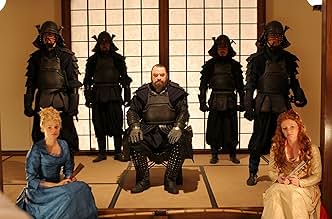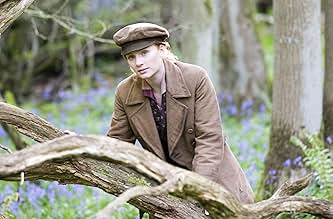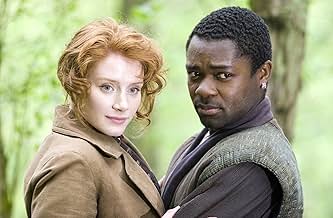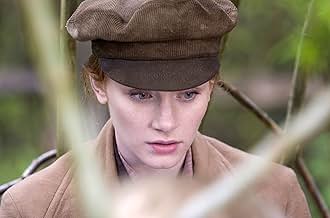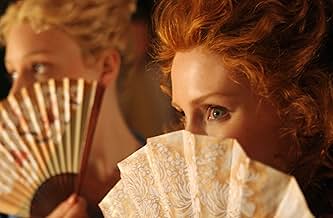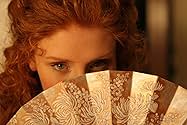IMDb रेटिंग
6.0/10
3.9 हज़ार
आपकी रेटिंग
एक शक्तिशाली शासक की बेटी को उस व्यक्ति के साथ रहने के लिए अपनी हिम्मत और कल्पनाशीलता दिखानी होगी, जिसे वह प्रेम करती है.एक शक्तिशाली शासक की बेटी को उस व्यक्ति के साथ रहने के लिए अपनी हिम्मत और कल्पनाशीलता दिखानी होगी, जिसे वह प्रेम करती है.एक शक्तिशाली शासक की बेटी को उस व्यक्ति के साथ रहने के लिए अपनी हिम्मत और कल्पनाशीलता दिखानी होगी, जिसे वह प्रेम करती है.
- निर्देशक
- लेखक
- स्टार
- पुरस्कार
- 1 जीत और कुल 6 नामांकन
Nobuyuki Takano
- Charles
- (as Nobuyuki "Daishi" Takano)
फ़ीचर्ड समीक्षाएं
An overthrown local monarch takes to the woods with a handful of loyal followers. His daughter also flees also, at a different time, following her true love (but dressed as a man). Only in Shakespeare do fathers/brothers/lovers not recognize each other because they're in different clothes.
Kenneth Branagh is good. He's very good. In fact, he's darn good. But he's not as good as he thinks.
He made a slight shift in locations for "Much Ado About Nothing" and it worked better than he could have hoped. He set Hamlet in a Ruritanian Denmark. Fine. I enjoyed it (helped along, I think, by the fact that I was just coming down with flu in 1996 and during the movie show my temperature shot up to 103).
But setting "As You Like It" in Japan was a risk. It also may be the only version some people ever see, which is a perversion. Whether it works is, of course, subjective. The movie's not bad but downbeat for a comedy. See it and make up your own mind.
(Fortunately, in "The Shakespeare Plays," comedies came out best, and the more conventional "As You Like It" with Helen Mirren is still wonderful, as is the Jacobean-set "Twelfth Night" with Felicity Kendall and the "Much Ado" with Cherie Lunghi; so anyone wanting more Shakespearean interpretations of these Shakespeare plays have those to fall back on. Get a region-free dvd/blu-ray player, if necessary.)
This version has Branagh's typical mix of his stock company (Brian Blessed, Richard Briars) and currently popular stars given a chance to display their acting chops. Some work better than others. In previous efforts Denzell Washington and Charlton Heston came off well; Keenu Reeves and Jack Lemmon, less so.
Shakespeare grew up near the forest of Arden and no doubt played there (as I did in a huge woods I grew up adjacent to) and remembered it in his manhood as a mystical place (as I do mine). He embued it with wonder, so much so the eggheads insist it's not that forest of Arden where "As You Like It" took place but in another of the same name. What was I saying about fathers and lovers not recognizing loved ones in different clothes? It's the same sort of thing.
I wished Branagh had made more Shakespeare in the 1990s when it was popular; but now I'm not so sure. Of course, funding is always a problem.
This version of "As You Like It" has one serious lack: Branagh himself. I like seeing him around but he remains behind the camera. I never wanted "Henry V," "Much Ado," and "Hamlet" to end. I watched the clock on this one.
But this version has a nice surprise ending. Stick around.
Kenneth Branagh is good. He's very good. In fact, he's darn good. But he's not as good as he thinks.
He made a slight shift in locations for "Much Ado About Nothing" and it worked better than he could have hoped. He set Hamlet in a Ruritanian Denmark. Fine. I enjoyed it (helped along, I think, by the fact that I was just coming down with flu in 1996 and during the movie show my temperature shot up to 103).
But setting "As You Like It" in Japan was a risk. It also may be the only version some people ever see, which is a perversion. Whether it works is, of course, subjective. The movie's not bad but downbeat for a comedy. See it and make up your own mind.
(Fortunately, in "The Shakespeare Plays," comedies came out best, and the more conventional "As You Like It" with Helen Mirren is still wonderful, as is the Jacobean-set "Twelfth Night" with Felicity Kendall and the "Much Ado" with Cherie Lunghi; so anyone wanting more Shakespearean interpretations of these Shakespeare plays have those to fall back on. Get a region-free dvd/blu-ray player, if necessary.)
This version has Branagh's typical mix of his stock company (Brian Blessed, Richard Briars) and currently popular stars given a chance to display their acting chops. Some work better than others. In previous efforts Denzell Washington and Charlton Heston came off well; Keenu Reeves and Jack Lemmon, less so.
Shakespeare grew up near the forest of Arden and no doubt played there (as I did in a huge woods I grew up adjacent to) and remembered it in his manhood as a mystical place (as I do mine). He embued it with wonder, so much so the eggheads insist it's not that forest of Arden where "As You Like It" took place but in another of the same name. What was I saying about fathers and lovers not recognizing loved ones in different clothes? It's the same sort of thing.
I wished Branagh had made more Shakespeare in the 1990s when it was popular; but now I'm not so sure. Of course, funding is always a problem.
This version of "As You Like It" has one serious lack: Branagh himself. I like seeing him around but he remains behind the camera. I never wanted "Henry V," "Much Ado," and "Hamlet" to end. I watched the clock on this one.
But this version has a nice surprise ending. Stick around.
How dumb do you have to be to watch a Shakespeare film and then complain, like certain reviews here, that it has Shakespeare's dialogue? What did you expect? Apart from anything else, the dialogue - the poetry of the greatest-ever writer of English - is the whole point. Without that, you have only a highly improbable story made up of contrived situations connected together only tenuously. With it - if it is well performed - a golden, magical glow of love and wit. If you don't understand it, rather than expecting it to be dumbed down to your level you should be prepared to put a bit of work in, read the play over slowly and puzzle it out - or else just admit that it is over your head. But don't blame the play for your own deficiencies.
I'm not fond, though, of the modern fashion for productions with apparently random, irrelevant concepts - in this case old-time Japan - to which Branners adds by his insistence on casting American stars who (inevitably) can't really handle the dialogue.
I'm not fond, though, of the modern fashion for productions with apparently random, irrelevant concepts - in this case old-time Japan - to which Branners adds by his insistence on casting American stars who (inevitably) can't really handle the dialogue.
Kenneth Branagh, aside from being a gifted actor with an enormous range of creative character abilities, has once again brought Shakespeare to life on the screen. His previous excursions into the bard's repertoire have included 'Much Ado About Nothing', 'Henry V', 'Love's Labours Lost', 'Hamlet', and 'Othello', and now he adds one of the bard's most successful comedies AS YOU LIKE IT to his list of successes. Branagh has the gift of making the visual aspects of Shakespeare's stories enhance the language and in doing so he makes Shakespeare sound like brilliant conversation (which it of course is) instead of stilted and brittle old English.
The 'gimmick' used here by Branagh in adapting Shakespeare's play is placing the action in 19th century Japan, and while other less sensitive directors might have opted to insert parody here, Branagh instead makes the story seem all the more plausible - the two feuding brothers (one dark and one light) whose struggle over their estate opens the play before credits with an ingenious silent drama of black leather feudal costumed men invading a genteel house party of lovely people enjoying a Japanese dancer's performance. The original brother is banished with his clan to the Arden forest and there the magic begins. Love between several couples is played in all its manifestations with disguise, misconceptions, lust, and poetry until the play's rollicking end in a song of Hey Nonny Nonny! The lovers include the disguised Rosalind (Bryce Dallas Howard) and Orlando (David Oyelowo), Celia (Romola Garai) and Oliver (Adrian Lester), the court fool Touchstone (a brilliant Alfred Molina) and Audrey (Janet McTeer), and Sylvius (Alex Wyndham) and Phoebe (Jade Jefferies). Brian Blessed plays the roles of both feuding brothers with style and authority, and Kevin Kline offers a fully realized Jaques - the character who is given the most memorable soliloquies in the play. The settings and imagery (Tim Harvey) are artistic and beautiful and captured with style by cinematographer Roger Lanser, and as with all of Branagh's production the music score (here by Patrick Doyle) is letter perfect and atmospheric.
But in the end the kudos go to Kenneth Branagh for his consistent courage and conviction that Shakespeare's plays are timeless, and his devotion to bringing them to the contemporary audience is to be applauded. This is a fine film - one to own! Grady Harp
The 'gimmick' used here by Branagh in adapting Shakespeare's play is placing the action in 19th century Japan, and while other less sensitive directors might have opted to insert parody here, Branagh instead makes the story seem all the more plausible - the two feuding brothers (one dark and one light) whose struggle over their estate opens the play before credits with an ingenious silent drama of black leather feudal costumed men invading a genteel house party of lovely people enjoying a Japanese dancer's performance. The original brother is banished with his clan to the Arden forest and there the magic begins. Love between several couples is played in all its manifestations with disguise, misconceptions, lust, and poetry until the play's rollicking end in a song of Hey Nonny Nonny! The lovers include the disguised Rosalind (Bryce Dallas Howard) and Orlando (David Oyelowo), Celia (Romola Garai) and Oliver (Adrian Lester), the court fool Touchstone (a brilliant Alfred Molina) and Audrey (Janet McTeer), and Sylvius (Alex Wyndham) and Phoebe (Jade Jefferies). Brian Blessed plays the roles of both feuding brothers with style and authority, and Kevin Kline offers a fully realized Jaques - the character who is given the most memorable soliloquies in the play. The settings and imagery (Tim Harvey) are artistic and beautiful and captured with style by cinematographer Roger Lanser, and as with all of Branagh's production the music score (here by Patrick Doyle) is letter perfect and atmospheric.
But in the end the kudos go to Kenneth Branagh for his consistent courage and conviction that Shakespeare's plays are timeless, and his devotion to bringing them to the contemporary audience is to be applauded. This is a fine film - one to own! Grady Harp
On the whole, I agree with the many reviewers before me who praise Kenneth Branagh in general and "As You Like It" in specific. So, I don't have to reiterate their comments here. I am writing to rebut the review by teacher_tom516 who completely misunderstands the movie, the play and the term "suspension of disbelief." Starting with the last, Samuel Taylor Coleridge called it "the willful suspension of disbelief," the tacit agreement made by the audience to leave reality at the door of the theater and accept the production's conceit as a temporary new reality. All theater, with the exception of the mercifully brief 19th century flirtation with "Realism/Naturalism", recognizes that it is an illusion to try to present "reality" on stage. Shakespeare certainly knew that and even tells his audience this in several of his plays (Henry V, Hamlet, The Tempest, A Midsummer Night's Dream, etc etc). His comedies are allegorical -- more subtly, so are his tragedies and even histories. His audiences accepted the premise without caviling over clocks striking in "Julius Caesar" and wild animals from different continents nonchalantly coexist. Shakespeare's Forest of Arden wasn't named for the Belgian Ardennes but taken from Lodge's romance "Rosalynde," from which Shakespeare cribbed his plot and characters. It is a magical place not found on maps -- it is the "Bitter Wood" of Medieval legend, the place where humans must face themselves, with or without Yoda. Arden was also Shakespeare's mother's family name. The writer plays the name game with the characters, seemingly unaware that Shakespeare's names are often chosen for their metaphoric associations. Falstaff is a "false staff" to Prince Hal. Why Orlando? Not because it's an Italian courtier's name, but because it's the Italian translation of Roland, the name of one of two legendary brothers-in-arms in the reign of Charlemagne, immortalized in "The Song of Roland." The other brother-knight's name was... Oliver! Also, It's Jaques, not Jacques, and may have been pronounced "Jakes", Brit slang for bathroom, which might be taken as ironic since he is such a pessimist, unlike his opposite, Touchstone, whose name might be taken as the iconic test of Truth. Do the hodge-podge of names in Hamlet disturb teacher_tom516? Claudius? Polonius? Laertes? Rosencrantz and Guildenstern!?
His biggest complaint is about the Japanese setting. Obviously, he didn't read the opening on-screen explanation Mr. Branagh thoughtfully provided for the edification of anyone interested in it. Is the Meiji Japan of the imagination be any less exotic than the locale of "A Winter's Tale" -- "the coast of Bohemia."? Bohemia doesn't have a coast -- it's completely landlocked. Oh yes, how absurd a scrawny kid could throw a Sumo wrestler? That's the whole point. Ever hear of Jack the Giant-killer? Beware people who confuse the truths of fairy tales with the factoids of spreadsheets. Yes, Shakespeare plays fast and loose with facts - so do creative directors interpreting his plays. As Miguel de Cervantes said, "One should never let facts get in the way of Truth." He also said, "Facts are the enemy of Truth."
His biggest complaint is about the Japanese setting. Obviously, he didn't read the opening on-screen explanation Mr. Branagh thoughtfully provided for the edification of anyone interested in it. Is the Meiji Japan of the imagination be any less exotic than the locale of "A Winter's Tale" -- "the coast of Bohemia."? Bohemia doesn't have a coast -- it's completely landlocked. Oh yes, how absurd a scrawny kid could throw a Sumo wrestler? That's the whole point. Ever hear of Jack the Giant-killer? Beware people who confuse the truths of fairy tales with the factoids of spreadsheets. Yes, Shakespeare plays fast and loose with facts - so do creative directors interpreting his plays. As Miguel de Cervantes said, "One should never let facts get in the way of Truth." He also said, "Facts are the enemy of Truth."
Seeing As You Like It, William Shakespeare's romantic comedy of mistaken identity brought back memories of an amateur production of the Carousel Theater here in Vancouver many years ago in which my son David played a small role. It was a wonderful presentation that thoroughly captured the genius of Shakespeare's delightful imagination. Unfortunately, the new filmed version by Kenneth Branagh with its big budget and professional cast is not in the least bit as convincing or entertaining. It is miscast, over produced, over acted, and simplistic with its multi-layered plot made easier to follow than Sesame Street.
Set in Japan in the 19th Century after the country was opened to the West as a trading partner, the royalty of England have been reinvented as wealthy merchants living on the Japanese seacoast. Neither the opulent backgrounds nor the conceit of the script, however, has any impact on either understanding or enjoyment of the play and the setting seems to be simply a marketing decision not an artistic one. The film opens with a kabuki scene at the court of Duke Senior (Brian Blessed). His brother Frederick, also played by Blessed with black hair, interrupts the proceedings to forcibly overthrow his brother's dukedom and the elder Duke is banished to the Arden Forest. Orlando, played by the Nigerian born David Oyelowo, and his brother Oliver (Adrian Lester) then proceed to fight over their position in the court.
Oliver, aligned with Frederick, entices his brother to take on a 300-pound sumo wrestler to all but certain doom but, as the script will have it, the underdog prevails in spite of a weight differential of about 150 pounds. In addition to being victorious at sport, he also falls for one of his well-wishers, the attractive Rosalind (Bryce Dallas Howard), daughter of Duke Senior. Fearful of her safety at the court, Rosalind, pretending to be a man and, taking the name of Ganymede from the handsome cup bearer to the Gods in Greek mythology, sneaks out with her cousin Celia (Romola Garai) and the clown Touchstone (Alfred Molina) to seek out her father in the Forest of Arden. Soon they are joined by Orlando who also fears for his life after a fight with his brother Oliver over their inheritance.
Before long, a bunch of other personages wander into the film including a melancholy philosopher named Jaques (Kevin Kline) who is described as "an exiled courtier", a young shepherd Silvius (Alex Wyndham) who pursues his reluctant girlfriend Phebe (Jade Jefferies), and others. Curiously, there are two characters named Jaques and two named Oliver, something that most writers would go to any length to avoid. The play is best noted for the cynical soliloquy chronicling the seven ages of man, "All the world's a stage and all the men and women merely players: They have their exits and their entrances, and one man in his time plays many parts", delivered with properly dour expression by Kline.
It would not be a Shakespearean comedy without some gender confusion and Rosalind, after noticing Orlando's love poems neatly positioned on trees all over their neck of the woods, knows that Orlando loves her. Approaching Orlando in her boy disguise as Ganymede, Rosalind endeavors to teach him the finer points of courtship if he would just pretend that he is a she. She uses her charm to seduce Orlando, but also is drawn reluctantly into a relationship with the shepherdess Phebe. In Elizabethan conventions, this meant that a boy playing the girl Rosalind would dress as a boy and then be wooed by another boy playing Phebe.
Quite naturally, this being a comedy and all, everyone ends up happy, (dramatized in a finale of the utmost silliness by Branagh) except for Jaques who, in character, decides not to return to the court. All the pieces are in place for the film to be successful but there are key elements that work against it. For the play to work at all, Rosalind has to be believable as a young man. If she is not, Orlando looks like a complete fool, and the play is robbed of its intended homoerotic playfulness. In this case, Branagh does not even attempt to have Rosalind look masculine and the scenes with Orlando in which he/she is teaching him how to express his love are unconvincing (unless you read it that Orlando goes along with the ruse and the author is simply making a statement about role playing, the masks people wear (himself?) in life, and the inauthenticity of self).
Rosalind is supposed to be pure, innocent, perhaps a little naïve but definitely virtuous. Howard, however, is very un-maiden like in appearance and manner and lacks any noticeable chemistry with her lover. She tries so hard to put the correct inflections in the words that she robs them of whatever poetry they might have had, conveying the impression that she is trying out eagerly for a grammar school play. This is Branagh's fifth attempt to put Shakespeare on film and I'm sure it won't be his last. After achieving considerable artistic but not financial success with the first three, he has opted in this latest film for less of an artistic statement than an overtly commercial approach. Love's Labours Lost was an unmitigated disaster scorched by the critics and shunned by audiences. Unfortunately, As You Like It may follow in its path.
Set in Japan in the 19th Century after the country was opened to the West as a trading partner, the royalty of England have been reinvented as wealthy merchants living on the Japanese seacoast. Neither the opulent backgrounds nor the conceit of the script, however, has any impact on either understanding or enjoyment of the play and the setting seems to be simply a marketing decision not an artistic one. The film opens with a kabuki scene at the court of Duke Senior (Brian Blessed). His brother Frederick, also played by Blessed with black hair, interrupts the proceedings to forcibly overthrow his brother's dukedom and the elder Duke is banished to the Arden Forest. Orlando, played by the Nigerian born David Oyelowo, and his brother Oliver (Adrian Lester) then proceed to fight over their position in the court.
Oliver, aligned with Frederick, entices his brother to take on a 300-pound sumo wrestler to all but certain doom but, as the script will have it, the underdog prevails in spite of a weight differential of about 150 pounds. In addition to being victorious at sport, he also falls for one of his well-wishers, the attractive Rosalind (Bryce Dallas Howard), daughter of Duke Senior. Fearful of her safety at the court, Rosalind, pretending to be a man and, taking the name of Ganymede from the handsome cup bearer to the Gods in Greek mythology, sneaks out with her cousin Celia (Romola Garai) and the clown Touchstone (Alfred Molina) to seek out her father in the Forest of Arden. Soon they are joined by Orlando who also fears for his life after a fight with his brother Oliver over their inheritance.
Before long, a bunch of other personages wander into the film including a melancholy philosopher named Jaques (Kevin Kline) who is described as "an exiled courtier", a young shepherd Silvius (Alex Wyndham) who pursues his reluctant girlfriend Phebe (Jade Jefferies), and others. Curiously, there are two characters named Jaques and two named Oliver, something that most writers would go to any length to avoid. The play is best noted for the cynical soliloquy chronicling the seven ages of man, "All the world's a stage and all the men and women merely players: They have their exits and their entrances, and one man in his time plays many parts", delivered with properly dour expression by Kline.
It would not be a Shakespearean comedy without some gender confusion and Rosalind, after noticing Orlando's love poems neatly positioned on trees all over their neck of the woods, knows that Orlando loves her. Approaching Orlando in her boy disguise as Ganymede, Rosalind endeavors to teach him the finer points of courtship if he would just pretend that he is a she. She uses her charm to seduce Orlando, but also is drawn reluctantly into a relationship with the shepherdess Phebe. In Elizabethan conventions, this meant that a boy playing the girl Rosalind would dress as a boy and then be wooed by another boy playing Phebe.
Quite naturally, this being a comedy and all, everyone ends up happy, (dramatized in a finale of the utmost silliness by Branagh) except for Jaques who, in character, decides not to return to the court. All the pieces are in place for the film to be successful but there are key elements that work against it. For the play to work at all, Rosalind has to be believable as a young man. If she is not, Orlando looks like a complete fool, and the play is robbed of its intended homoerotic playfulness. In this case, Branagh does not even attempt to have Rosalind look masculine and the scenes with Orlando in which he/she is teaching him how to express his love are unconvincing (unless you read it that Orlando goes along with the ruse and the author is simply making a statement about role playing, the masks people wear (himself?) in life, and the inauthenticity of self).
Rosalind is supposed to be pure, innocent, perhaps a little naïve but definitely virtuous. Howard, however, is very un-maiden like in appearance and manner and lacks any noticeable chemistry with her lover. She tries so hard to put the correct inflections in the words that she robs them of whatever poetry they might have had, conveying the impression that she is trying out eagerly for a grammar school play. This is Branagh's fifth attempt to put Shakespeare on film and I'm sure it won't be his last. After achieving considerable artistic but not financial success with the first three, he has opted in this latest film for less of an artistic statement than an overtly commercial approach. Love's Labours Lost was an unmitigated disaster scorched by the critics and shunned by audiences. Unfortunately, As You Like It may follow in its path.
क्या आपको पता है
- ट्रिवियाThis was the ninth and final film directed by Kenneth Branagh in which Richard Briers stars. The others are Henry V (1989), Peter's Friends (1992), Swan Song (1992), Much Ado About Nothing (1993), फ्रैंकनस्टाइन (1994), In the Bleak Midwinter (1995), Hamlet (1996) and Love's Labour's Lost (2000).
- गूफ़Lions are not native to Japan. The lion is a carryover from the original play, which was set in a generic European country at an indeterminate time in the Middle Ages. Even that didn't make much sense, as lions have been extirpated from the main part of Europe since the 4th century AD, and from the Caucasus since the 10th century. But many Europeans, possibly including William Shakespeare, didn't know that lions weren't around anymore.
- भाव
Touchstone: The fool doth think he is wise, but the wise man knows himself to be a fool.
- क्रेज़ी क्रेडिटThe picture seems to end without the play's Epilogue. Then, the closing credits begin, when they are suddenly interrupted by Bryce Dallas Howard, still in character as Rosalind, who then is seen speaking the Epilogue as she begins to walk to her trailer, drinking a cup of coffee along the way. After the speech, Kenneth Branagh can be heard off-screen saying "Aaaand...cut!" After this, the closing credits resume.
- इसके अलावा अन्य वर्जनThe version shown on cable television has been formatted to the aspect ratio commonly used in HDTV production (that is, anywhere from 1.78:1 to 1.85:1), while the version released to movie theatres was released in the typical CinemaScope/Panavision aspect ratio (2.39:1). It is the theatrical version which has been issued on DVD. Since the film was made using the Super 35 format, it was possible to make versions of the film in different aspect ratios.
- कनेक्शनFeatured in 14th Annual Screen Actors Guild Awards (2008)
- साउंडट्रैकUnder the Greenwood Tree
Composed by Patrick Doyle
Lyrics by William Shakespeare
Performed by Patrick Doyle and London Symphony Orchestra
टॉप पसंद
रेटिंग देने के लिए साइन-इन करें और वैयक्तिकृत सुझावों के लिए वॉचलिस्ट करें
- How long is As You Like It?Alexa द्वारा संचालित
विवरण
- रिलीज़ की तारीख़
- कंट्री ऑफ़ ओरिजिन
- भाषा
- इस रूप में भी जाना जाता है
- Nasıl Hoşunuza Giderse
- फ़िल्माने की जगहें
- उत्पादन कंपनियां
- IMDbPro पर और कंपनी क्रेडिट देखें
बॉक्स ऑफ़िस
- दुनिया भर में सकल
- $5,63,162
- चलने की अवधि2 घंटे 7 मिनट
- रंग
- ध्वनि मिश्रण
इस पेज में योगदान दें
किसी बदलाव का सुझाव दें या अनुपलब्ध कॉन्टेंट जोड़ें





